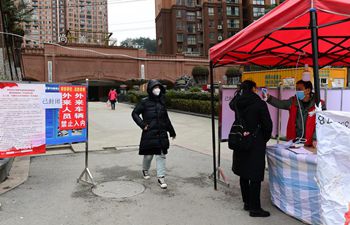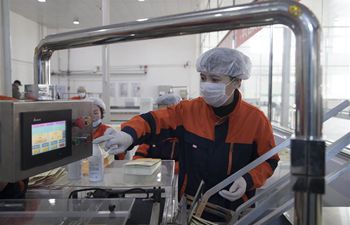RAMALLAH, Feb. 5 (Xinhua) -- The Palestinian government declared that its decision to ban Israeli products into its market will come into effect at noon on Wednesday.
Palestinian officials said that the ban came in response to Israel's ban on Palestinian vegetable produce from its markets last week, and that they hope it will boost the local agricultural sector.
The ban includes the import of fruits and vegetables as well as bottled water and soft drinks.
However, Israeli authorities on Wednesday prevented shipments of dates and herbs from passing through checkpoints to get to Israeli ports for export, in an apparently retaliatory move.
Spokesperson of the Palestinian Economy Ministry Azmi Abdelrahman said this decision could lead to significant losses on the Israeli side, and that is probably why Israeli authorities are obstructing export of Palestinian dates and herbs.
"The Israeli move against Palestinian exporters violates the Paris Protocol that states Palestinian exporters have the right to use Israeli ports freely," said Abdelrahman.
The Paris Protocol is an economic treaty reached in 1995 between Palestine and Israel to govern the economic relations between the two sides.
Head of Palestinian Palms and Dates Council Ibrahim Ide'iq confirmed to Xinhua that the Israeli authorities on checkpoints have sent back at least eight trucks of date shipments that were on their way to be exported to different countries, including the United States and Turkey.
"We were not officially informed of the ban on our exports," Ide'iq said. "Our staff were only told that we are banned from our right to export verbally, and this could have serious repercussions on our companies."
The eight truck loads shipment carries about 160 tons of dates, with hundreds of tons more waiting to be exported before the high season of Ramadan starts in spring.
According to the Palestinian Ministry of Economy, Palestinian import of fresh produce of vegetables and fruits from Israel reaches 55 million U.S. dollars annually, but the Palestinian side pays around 300 million dollars for vegetables from the Israeli market, in addition to some 100 million dollars for the bottled water and soft drinks.
"The government has decided to respond with reciprocal measures after the Israelis banned the import of Palestinian fruits and vegetables, assuming the pressures will be on us, but in fact our agricultural sector can provide over 85 percent of the market demand at this point," said Abdelrahman.
"Once the decision comes into effect, the losses will mostly be on the Israeli side, because the Palestinian imports are larger in value," he said.
Abdelrahman added that the government is looking into ways to assist the local farmers who have already signed contracts with Israeli factories to cut down their loses, after their products are no longer allowed in Israel.
Meanwhile, Chair of the Palestinian Society for Consumer Protection Salah Haniye said that all major stakeholders and merchants have been officially informed of the decision, he will work on prevention of price inflation or smuggling of Israeli products illegally.
"The decision was initiated by the government and it will be an opportunity to sustain the Palestinian farmers and the merchants," Haniye said, "but it needs to be supported by other policies that would encourage the agricultural sector through policies like tax refunds or providing seedlings, on order to help farmers make use of more lands and vary their produce."
However, he warned that Israeli authorities may take further restrictive measures against Palestinian exporters who have no option but to use the Israeli ports and crossings, as Israel controls all borders.
He noted that this is especially critical for exports of fresh produce.
According to the latest figures by the Palestinian Economy Ministry, Palestinian agricultural exports to the Israeli market during 2018 reached 88 million dollars, which represents 68 percent of the total of Palestine's agricultural exports to the world, amounting to 130 million dollars.
However, the imports of Israeli agricultural products, of all types, has reached 600 million U.S., out of which, fresh produce of fruits and vegetables was 300 million U.S. dollars.
Bilateral trade between Palestine and Israel alone stood at around 4.5 billion dollars in 2018, while the trade amounted to 7.6 billion dollars between Palestine with the world.

















